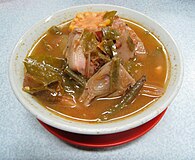Sayur asem
 Sayur asem | |
| Course | main course |
|---|---|
| Place of origin | Indonesia[1] |
| Region or state | Jakarta, West Java, Banten |
| Associated cuisine | Southeast Asia |
| Serving temperature | hot and room temperature |
| Main ingredients | various vegetables in tamarind soup |
Sayur asem or sayur asam is an Indonesian vegetable soup. It is a popular Southeast Asian dish originating from Sundanese cuisine, consisting of vegetables in tamarind soup.[2]
The sweet and sour flavour of this dish is considered refreshing and very compatible with fried or grilled dishes, including salted fish, ikan goreng, ayam goreng and lalapan, a kind of vegetable salad usually served raw but can also be cooked, and is usually eaten with steamed rice and sambal terasi chili paste.
The origin of the dish can be traced to the Sundanese people of West Java, Banten, and the Jakarta region. It is well known to be a part of the Sundanese cuisine and the Betawi daily diet.
Ingredients
[edit]Common ingredients are peanuts, young jackfruit, young leaves and unpeeled seeds of melinjo, bilimbi, chayote, and long beans; These are all cooked in tamarind-based soups and sometimes enriched with beef stock. Quite often, the recipe also includes corn.
Variants
[edit]Several variations exist, including sayur asem Jakarta (a version from the Betawi people of Jakarta), sayur asem kangkung (a version which includes water spinach), sayur asem ikan asin (includes salted fish, usually snakehead murrel), sayur asem talas (with taro and its leaves), and sayur asem kacang merah (consists of red beans and green beans in tamarind and beef stock). The Karo version of sayur asem is made using torch ginger buds and, more importantly, the sour-tasting seed pods. Sayur asem rembang is a vegetable soup with a sour flavor.[3][4]
- Sayur asem
See also
[edit]References
[edit]- ^ "Sejarah lahirnya Sayur asem". (Indonesian)
- ^ "40 of Indonesia's best dishes". CNN Travel. August 9, 2011. Retrieved January 30, 2015.
- ^ Planet, L.; Berkmoes, R.V.; Brash, C.; Cohen, M.; Elliott, M.; Mitra, G.; Noble, J.; Skolnick, A.; Stewart, I.; Waters, S. (2010). Lonely Planet Indonesia. Travel Guide. Lonely Planet Publications. p. 81. ISBN 978-1-74220-348-5. Retrieved January 30, 2015.
- ^ Bacon, D.; Collins, T. (2010). CultureShock! Jakarta: A Survival Guide to Customs and Etiquette. Culture shock!. Marshall Cavendish International Asia Pte Ltd. p. 217. ISBN 978-981-4435-56-7. Retrieved January 30, 2015.


